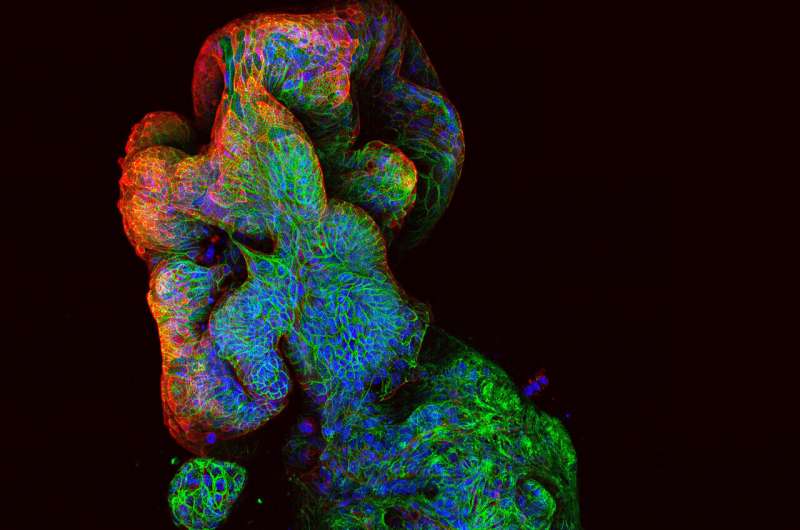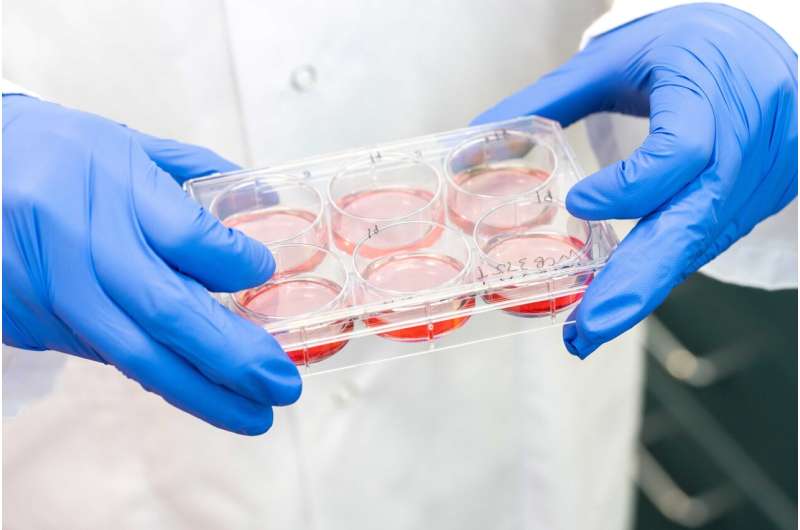This article has been reviewed according to Science X's editorial process and policies. Editors have highlighted the following attributes while ensuring the content's credibility:
fact-checked
peer-reviewed publication
trusted source
proofread
Lab-grown tumors predict treatment outcomes in landmark study

Researchers have grown tumors in the lab to accurately predict which drugs will work for people with bowel cancer—before they begin treatment.
The world-first study led by WEHI (based in Melbourne, Australia) found drug testing on tumor organoids—3D cancer models grown from a patient's own tissue—could show how they will respond to a specific cancer treatment.
A clinical trial is now being developed based on the results, which will be the first to validate organoid drug testing as an accurate way to guide treatment selection for people living with bowel cancer—the second-deadliest cancer in Australia.
The study, "Unified framework for patient-derived tumor organoid-based predictive testing of standard-of-care therapies in metastatic colorectal cancer," is published in the journal Cell Reports Medicine.
Bowel cancer, also known as colorectal cancer, remains the second leading cause of cancer-related deaths worldwide. It is also the fourth most diagnosed cancer in Australia.
While bowel cancer cases can be treated successfully if found early, less than half of all patients are diagnosed at the initial stages due to a lack of symptoms. This means that patients are often diagnosed once the cancer has spread to other parts of the body.
Despite an increasing number of treatment options available to treat bowel cancer, there currently is a limited ability to predict which therapy will be most effective for each patient.
A tumor organoid is a miniature 3D model of a cancer that is the size of a grain of sand. Grown in a laboratory from a patient's own tissue sample, tumor organoids mimic the characteristics of the cancer from which they were created, including sensitivity to drug treatment.

In their study, WEHI researchers showed the technology can identify the most effective treatment for individual bowel cancer patients, by assessing how their organoids responded to specific drugs.
Co-lead researcher and medical oncologist, Professor Peter Gibbs, said the finding could end the current trial-and-error process that goes into selecting a cancer treatment for patients and improve their quality of life.
"Each time you give a patient an ineffective treatment, you lose 2–3 months on something that won't work," Prof Gibbs, also a WEHI Laboratory Head, said.
The window for successful treatment is often limited, so it is vital that we choose the options with the highest chance of success and avoid other treatments that are unlikely to work."
"Our findings show that organoid drug testing is a potential game-changer for cancer treatment, suggesting the possibility of revolutionizing personalized medicine and clinician-patient care through improved treatment selection."
As hundreds of organoids can be grown from one patient tissue sample, it is possible to test a wide range of different therapy options in the laboratory.
"Many patients with advanced bowel cancer only get one or two chances at treatment. Knowing what is most likely to work before they start treatment would make a significant difference to their survival outcomes and quality of life," Prof Gibbs said.
Technology of the future
As part of the study the organoids of 30 patients with advanced stages of bowel cancer were used to pre-test chemotherapy drugs in a clinical feasibility trial.
Associate Professor Oliver Sieber, the corresponding author and WEHI Laboratory Head, said seeing the promising results of the study was a groundbreaking moment for the team that validated over five years of research.
"If a drug had no effect on the tumor organoid, then this treatment would also have no effect on the patient—and vice versa," Assoc Prof Sieber said.
"Our study showed organoid drug testing was able to predict treatment responses for study patients with a notable 83% accuracy.
"Importantly, pre-testing showed the therapies that won't work with over 90% accuracy."
Researchers also used the organoids to test the effectiveness of chemotherapy drugs that are not commonly used for bowel cancer patients.
They found two patient organoids were sensitive to a drug that is often used for breast and bladder cancers.
"Not only did we show that organoid drug testing could, for the first time, predict patient responses to bowel cancer treatment, we also managed to find a new therapeutic option for patients in our trial.
"That is the power of this incredible technology."
Collaborative trial
The study, with first author Dr. Tao Tan, is being translated into a clinical trial that will open at multiple Victorian hospitals this year.
The researchers hope to recruit patients recently diagnosed with bowel cancer to assess whether their tumor organoids can accurately predict individual responses to treatment.
More information: Tao Tan et al, Unified framework for patient-derived, tumor-organoid-based predictive testing of standard-of-care therapies in metastatic colorectal cancer, Cell Reports Medicine (2023). DOI: 10.1016/j.xcrm.2023.101335


















